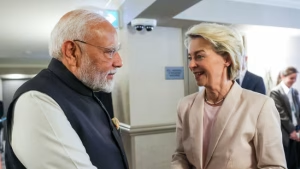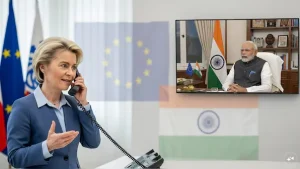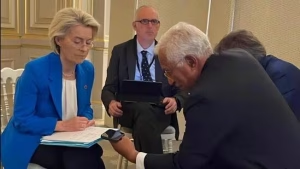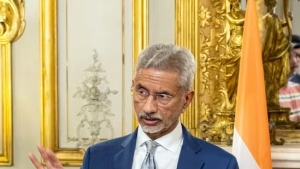New Delhi – The recent conversation where EU Chief Speaks With Modi highlighted India’s pivotal role in resolving the ongoing Ukraine conflict. European Commission President Ursula von der Leyen and European Council President Antonio Costa conducted a telephonic discussion with Prime Minister Narendra Modi on Thursday, emphasizing India’s unique position in global peace efforts.
During this significant diplomatic exchange where EU Chief Speaks With Modi, von der Leyen specifically praised India’s continued engagement with Ukrainian President Volodymyr Zelensky, recognizing New Delhi’s balanced approach to international conflict resolution.
India’s Strategic Role in Ukraine Conflict Resolution

The conversation where EU Chief Speaks With Modi underscored India’s potential contribution to ending the Ukraine war. Von der Leyen explicitly stated that “India has an important role to play in bringing Russia to end its war of aggression and helping create a path towards peace.”
This acknowledgment during the call where EU Chief Speaks With Modi reflects the European Union’s recognition of India’s diplomatic influence with both Russia and Ukraine. The EU leadership views India’s traditional non-aligned stance and established relationships with all parties as valuable assets in peace mediation efforts.
Global Security Implications Discussed


During the session where EU Chief Speaks With Modi, von der Leyen emphasized the worldwide consequences of the Ukraine conflict. She characterized the war as a global concern, stating, “This war carries global security consequences and undermines economic stability. So it is a risk to the entire world.”
The discussion where EU Chief Speaks With Modi highlighted how regional conflicts create international ripple effects, affecting economic stability and security frameworks beyond Europe. This perspective demonstrates the EU’s understanding of India’s legitimate concerns about global stability and economic disruption.
Future EU-India Strategic Partnership
The conversation where EU Chief Speaks With Modi extended beyond immediate conflict resolution to long-term bilateral cooperation. Von der Leyen announced plans for both sides to agree on “a joint strategic agenda at the next EU–India summit, as early as possible in 2026.”
This forward-looking approach during the call where EU Chief Speaks With Modi demonstrates commitment to strengthening institutional frameworks for continued cooperation. The proposed strategic agenda would formalize cooperation mechanisms across multiple sectors, including security, economics, and technology.
Free Trade Agreement Progress Emphasized

A significant portion of the discussion where EU Chief Speaks With Modi focused on the pending Free Trade Agreement negotiations. Von der Leyen reaffirmed the European Union’s commitment to “concluding the Free Trade Agreement negotiations by the end of the year,” while emphasizing that “progress is needed now.”
Also Read: Trump WW2 Comment: Explosive Criticism of China’s War Anniversary Ceremony
This urgency expressed when EU Chief Speaks With Modi builds upon previous commitments made during von der Leyen’s February 28 discussion with Modi, where both leaders agreed to finalize the long-pending trade deal by year-end. The repeated emphasis demonstrates both sides’ recognition of the agreement’s economic importance.
External Affairs Minister’s Parallel Statements

The timing of the session where EU Chief Speaks With Modi coincided with relevant statements from External Affairs Minister S. Jaishankar. On Wednesday, Jaishankar expressed India’s desire for ongoing EU negotiations to reach a “decisive conclusion” at the earliest, reinforcing the momentum generated by high-level diplomatic engagement.
Jaishankar made these remarks during a joint media briefing with German counterpart Johann Wadephul, who was conducting a two-day visit to India. This coordinated messaging suggests comprehensive preparation for the conversation where EU Chief Speaks With Modi.
Upcoming Negotiation Timeline
Following the productive exchange where EU Chief Speaks With Modi, concrete steps are being implemented to advance trade discussions. India will host the 13th round of FTA negotiations with the EU in New Delhi on September 8, continuing momentum from the previous round held in Brussels earlier this year.
This scheduled meeting represents direct follow-up to commitments made during the call where EU Chief Speaks With Modi, translating diplomatic engagement into practical negotiation sessions aimed at resolving outstanding trade issues.
Historical Context of Trade Negotiations
The current progress stems from resumed talks in June 2022 after an eight-year suspension. The negotiations aim for a comprehensive FTA alongside an investment protection agreement and a pact on geographical indications. Previous discussions stalled in 2013 due to market access disagreements.
The renewed momentum following instances where EU Chief Speaks With Modi suggests both sides have developed more flexible approaches to previously contentious issues. The combination of high-level political commitment and technical-level negotiations creates favorable conditions for breakthrough agreements.
Strategic Implications for Global Diplomacy
The regular engagement where EU Chief Speaks With Modi reflects broader shifts in international relations, with middle powers like India gaining recognition as crucial mediators in global conflicts. The EU’s explicit acknowledgment of India’s peace-making potential represents evolving multipolar diplomatic dynamics.
This recognition positions India as a bridge between different international blocs while maintaining its traditional non-aligned principles, creating opportunities for constructive engagement on multiple global challenges beyond immediate trade and security concerns.

